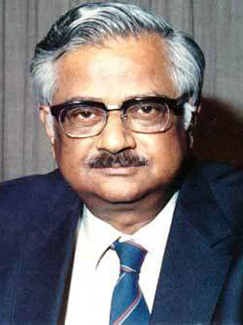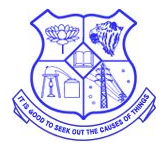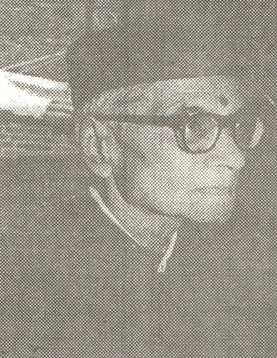Related Research Articles

Operation Smiling Buddha or Operation Happy Krishna was the assigned code name of India's first successful nuclear bomb test on 18 May 1974. The bomb was detonated on the army base Pokhran Test Range (PTR), in Rajasthan, by the Indian Army under the supervision of several key Indian generals.

Raja Ramanna was an Indian physicist who is best known for his role in India's nuclear program during its early stages.

Homi Jehangir Bhabha, FNI, FASc, FRS, Hon.FRSE was an Indian nuclear physicist who is widely credited as the "father of the Indian nuclear programme". He was the founding director and professor of physics at the Tata Institute of Fundamental Research (TIFR), as well as the founding director of the Atomic Energy Establishment, Trombay (AEET) which was renamed the Bhabha Atomic Research Centre in his honour. TIFR and AEET served as the cornerstone of the Indian nuclear energy and weapons programme. He was the first chairman of the Indian Atomic Energy Commission and secretary of the Department of Atomic Energy. By supporting space science projects which initially derived their funding from the AEC, he played an important role in the birth of the Indian space programme.

Tata Institute of Fundamental Research (TIFR) is an Indian Research Institute under the Department of Atomic Energy of the Government of India. It is a public deemed university located at Navy Nagar, Colaba in Mumbai. It also has campus in Bangalore, International Centre for Theoretical Sciences (ICTS), and an affiliated campus in Serilingampally near Hyderabad. TIFR conducts research primarily in the natural sciences, the biological sciences and theoretical computer science.

Mambillikalathil Govind Kumar Menon also known as M. G. K. Menon, was a physicist and policy maker from India. He had a prominent role in the development of science and technology in India over four decades. One of his most important contributions was nurturing the Tata Institute of Fundamental Research, Mumbai, which his mentor Homi J. Bhabha founded in 1945.

Elphinstone College is one of the constituent colleges of Dr. Homi Bhabha State University, a state cluster university. Established in 1823, it is one of the oldest colleges in Mumbai. It played a major role in shaping and developing the educational landscape of the city. It also played a pivotal role in the inception of the University of Mumbai.
Ravi B. Grover is an Indian nuclear scientist and a mechanical engineer. He is the founding vice-chancellor of the Homi Bhabha National Institute, a member of the Atomic Energy Commission, chairman of the Board of Research in Nuclear Sciences, a fellow of the Indian National Academy of Engineering, and World Academy of Art and Science. He was the president of the Indian Society of Heat and Mass Transfer for the period 2010–2013. He has been awarded Padma Shri by the Government of India in the year 2014.

The Institute of Science (formerly known as the Royal Institute of Science (RIS)) is an institution of postgraduate education and research located in Mumbai, India. It is managed by the Government of Maharashtra and is currently clustered from 2019 batch with the Dr. Homi Bhabha State University. However, previously enrolled batch students will get their degree affiliated to the Mumbai University. It is accredited with an 'A' Grade by the National Assessment and Accreditation Council (NAAC) in March 2014.
Rajaram College, Kolhapur is a government college affiliated to Shivaji University in Kolhapur. It offers junior college-level courses such as 11th & 12th, bachelor degree level courses such as in science, humanities, languages and arts and offers an MA in Psychology and Home science. It also runs MSc in Analytical Chemistry It also has a popular junior college offering higher secondary education courses in science and arts.

Sharada SrinivasanFRAS FAAAS is an archaeologist specializing in the scientific study of art, archaeology, archaeometallurgy and culture. She is a Professor at the National Institute of Advanced Studies, Bangalore, India, and an Honorary University Fellow at the University of Exeter, UK. Srinivasan is also an exponent of classical Bharatanatyam dance. She was awarded India's fourth highest civilian award the Padma Shri in 2019. She is a member of the Calamur family.
Padmanabhan Krishnagopala Iyengar, was an Indian nuclear physicist who is widely known for his central role in the development of the nuclear program of India. Iyengar previously served as the director of BARC and former chairman of the Atomic Energy Commission of India, he raised his voice and opposition against the nuclear agreement between India and the United States and expressed that the deal favoured the United States.

Malur Ramasamy Srinivasan, is an Indian nuclear scientist and mechanical engineer. He played a key role in the development of India's nuclear power programme and the development of the PHWR. He received the Padma Vibhushan Award.
Raja Shivaji Vidyalaya is one of the three medium high schools, in the Dadar neighborhood of Mumbai, Maharastra, India. Raja Shivaji is a Marathi medium school and the Indian Education Society's aka IES English Medium is the larger part of the school. There is also a small Gujarati medium section in the premises. The school was founded in 1912, and named in honor King George V who had visited India in 1911. It was renamed in 1974, at which time it switched from an English language curriculum to a Marathi curriculum. It has since resumed English education, becoming a "semi-English" institution. In 2012, former President of India, Pratibha Patil was the guest of honor at the school's centenary celebration.

Bhalchandra Pandharinath Bahirat was a philosopher and educationist who studied the Marathi literature of Jñāneśvar and other sants of Maharashtra. He was awarded an honorary Doctor of Letters from Pune University in 1991.

Jyeshtharaj Bhalchandra Joshi is an Indian chemical engineer, nuclear scientist, consultant and professor, widely known for his innovations in nuclear reactor designs and generally regarded as a respected teacher. He is the DAE-Homi Bhabha Chair Professor, Homi Bhabha National Institute, Mumbai, and is the recipient of Shantiswarup Bhatnagar Prize for Engineering Sciences and many other awards and recognitions. He received the third highest civilian honour, the Padma Bhushan, in 2014 for his services to the field of chemical engineering and nuclear science.
Badanaval Venkatasubba Sreekantan was an Indian high-energy astrophysicist and a former associate of Homi J. Bhabha at the Tata Institute of Fundamental Research (TIFR). He was also a Dr. S. Radhakrishnan Visiting Professor at the National Institute of Advanced Studies, Bangalore.
Satinder Kumar Sikka was an Indian nuclear condensed matter physicist, crystallographer and a former Scientific Secretary to the Principal Scientific Advisor of the Government of India. He was known to have played a crucial role, along with Raja Ramanna, Rajagopala Chidambaram and Basanti Dulal Nagchaudhuri, in the design and development of a Hydrogen Bomb by India, which was tested at the Pokhran Test Range in May 1998, under the code name, Operation Shakthi. He was also involved in the Smiling Buddha tests, conducted in 1974. He was awarded the fourth highest civilian award of the Padma Shri, by the Government of India, in 1999.

Jayant Bhalchandra Udgaonkar is an Indian biochemist, molecular biologist, and academic at the Indian Institute of Science Education and Research, Pune. He is the former Director of the Indian Institute of Science Education and Research, Pune, and was previously a senior professor at the National Centre for Biological Sciences. A J.C. Bose National Fellow, he is known for his studies on protein folding. He is an elected fellow of the Indian Academy of Sciences, Indian National Science Academy and The World Academy of Sciences. The Council of Scientific and Industrial Research, the apex agency of the Government of India for scientific research, awarded him the Shanti Swarup Bhatnagar Prize for Science and Technology, one of the highest Indian science awards, in 2000, for his contributions to biological sciences. He is the son of noted scientist Padmabhushan Bhalchandra Udgaonkar.
Virendra Singh is an Indian theoretical physicist and a former C. V. Raman chair professor and director of the Tata Institute of Fundamental Research (TIFR). Known for his research in high energy physics, Singh is an elected fellow of all the three major Indian science academies - Indian National Science Academy, Indian Academy of Sciences and National Academy of Sciences, India as well as The World Academy of Sciences. The Council of Scientific and Industrial Research, the apex agency of the Government of India for scientific research, awarded him the Shanti Swarup Bhatnagar Prize for Science and Technology, one of the highest Indian science awards, for his contributions to Physical Sciences in 1973.
Arvind Kumar is an Indian physicist and educationist. He was Centre Director, Homi Bhabha Centre for Science Education, Mumbai, during the period 1994-2008. For his contributions in the field of science education, he was awarded the Padma Shri, India's fourth highest civilian honour, in 2010. He is a Fellow of the National Academy of Sciences, India, and is the recipient of several other honours and awards, including the TWAS regional award for Science Education.
References
- ↑ "B. M. Udgaonkar Eminent Scientist & Educationist" (PDF). Homi Bhabha Centre for Science Education. 2016. Retrieved 2 May 2016.
- ↑ "Past Students who were honoured with 'Padma Puraskar'". Raja Shivaji Vidyalay. 2016. Retrieved 3 May 2016.
- ↑ "Bhalchandra Madhav Udgaonkar on IAS". Institute of Advanced Study. 2016. Retrieved 3 May 2016.
- ↑ "About MaViPa". Marathi Vidnyan Parishad. 2016. Retrieved 3 May 2016.[ permanent dead link ]
- ↑ "Udgaonkar, B. M." WorldCat Identities. 2016. Retrieved 3 May 2016.
- ↑ Olivier Coutard (4 January 2002). The Governance of Large Technical Systems. Routledge. pp. 261–. ISBN 978-1-134-64494-0.
- ↑ Michael P. Fry; N. Patrick Keatinge; Joseph Rotblat (6 December 2012). Nuclear Non-Proliferation: and the Non-Proliferation Treaty. Springer Science & Business Media. pp. 168–. ISBN 978-3-642-75105-9.
- ↑ Joseph Rotblat; Sven Hellman (1994). A World at the Crossroads: New Conflicts, New Solutions : Annals of Pugwash 1993. World Scientific. pp. 34–. ISBN 978-981-02-2036-5.
- ↑ "Padma Awards" (PDF). Ministry of Home Affairs, Government of India. 2016. Archived from the original (PDF) on 15 October 2015. Retrieved 3 January 2016.